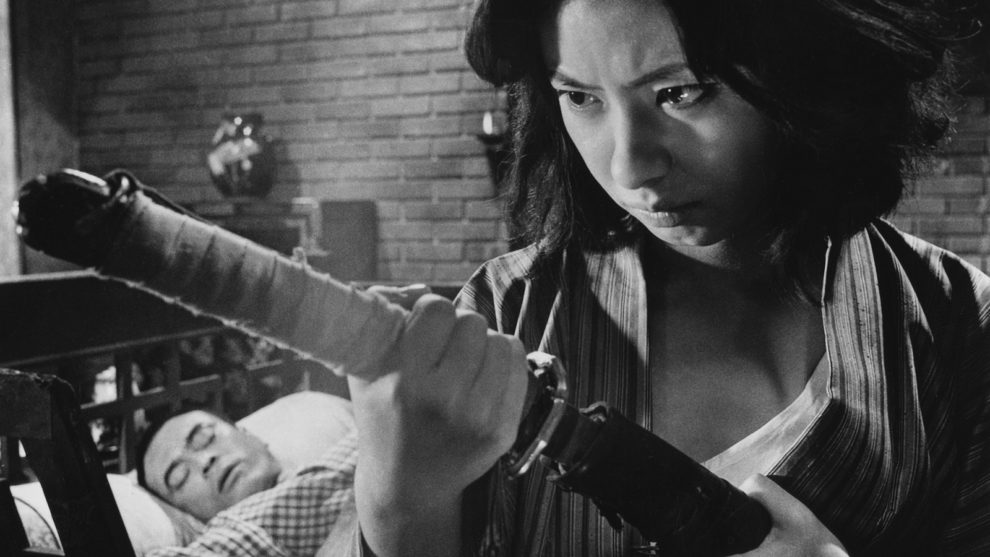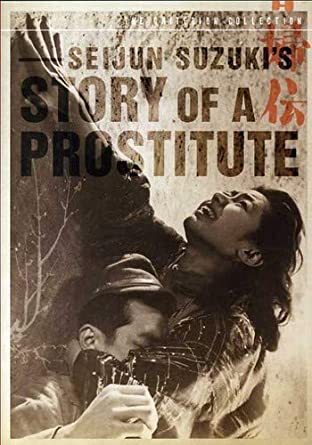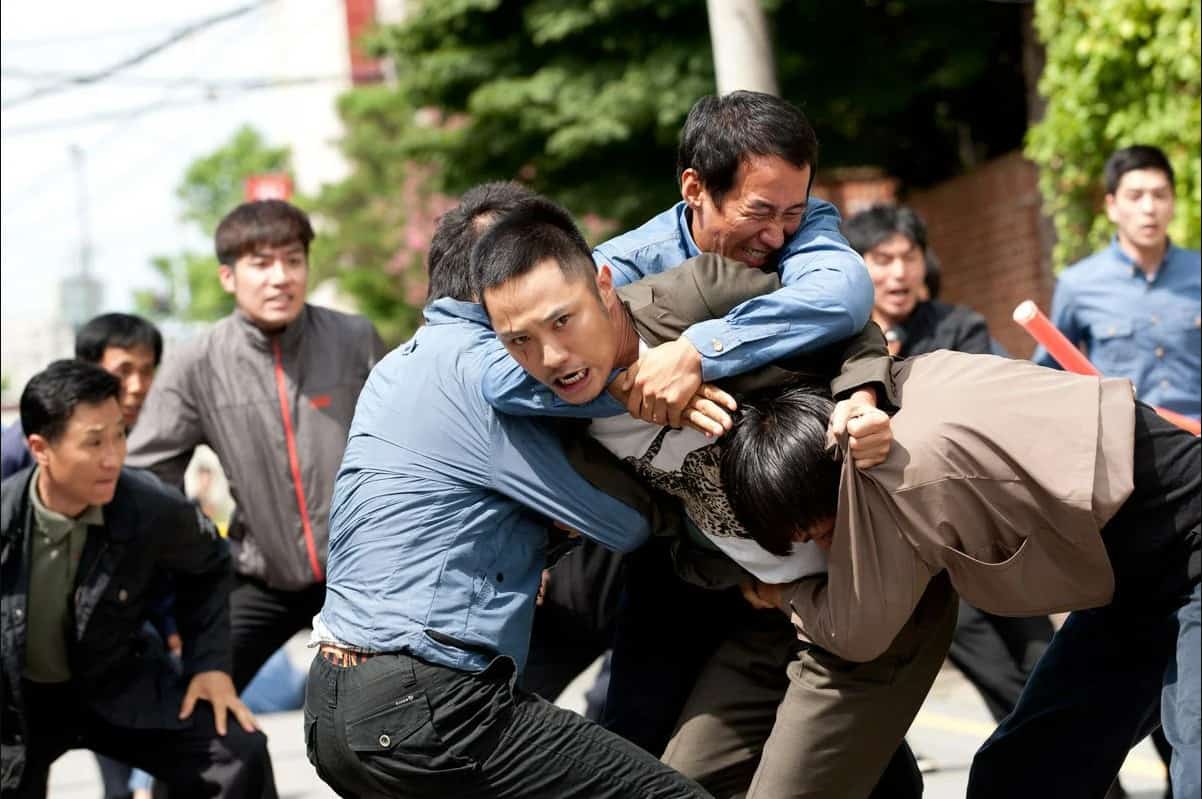A year after the great “Gate of Flesh“, Seijun Suzuki returned with “Story of a Prostitute”, the second part of what later came to be known as the “Flesh Trilogy”. Like the former, this one is also based on a story by Taijiro Tamura and deals with women who make a living by selling their flesh.
Angry at her lover who marries another woman, the prostitute Harumi (Yumiko Nogawa) decides to become a “comfort woman” (i.e. army prostitute) in Manchuria and service the Japanese Imperial army in their war with China. Quickly after arriving at the army outpost and starting her new dehumanizing job, Harumi is liked by the brutal unit adjutant lieutenant Narita (Isao Tamagawa) who wants to make her his. Yet, to spite him, she starts paying attention to his quiet and shy aide, Mikami (Tamio Kawachi). Though initially repelled by her, the young man starts to slowly fall for the prostitute and the two begin a dangerous clandestine affair behind the adjutant's back.
Suzuki's movie shows a very different face of war than than found in the media from the period, including the other adaptation of the same story, “Escape at Dawn”. Whereas many other war movies deal with the heroism of the common soldier and his sacrifice for a greater good, “Story of a Prostitute” shows a very different face of the war – it subverts the traditional heroic image of the warrior and shows him as a rather pathetic and cowardly liar. Or in other words, as a normal person. He does not want to sacrifice himself for some good decided by the empire, rather, he wants to survive, live as easy life as possible, and have free sex at the “comfort” stations. For example, around the middle of the film one of the soldiers deserts his post and runs into the desert. Yet, instead of telling the truth about what he did, his superiors make up a story of him dying in a battle or something similar. Doing this, they manage not only to hide the dirty truth and protect themselves from shame (and more importantly, punishment), but also to make their unit seem very heroic when, in reality, the soldiers mostly laze around, train, and have sex with the comfort women. This scene shows another aspect of Suzuki's view on war, namely the fact that for him it is the higher ranking soldiers who are the evil and debased ones and not those of lower rank. We see that best in Lt. Narita who beats, rapes, and bullies everyone with a fierceness that suggests the complete loss of his humanity.

On the other hand, it is the prostitutes that are depicted as honorable and dedicated subjects of the empire. They do a completely dehumanizing work of what can be only called conveyor belt of sex or rape just to “help” the young soldiers blow off some steam. In other words, they are the ones who are using their bodies to serve the empire. It is precisely this reversal of roles that makes the film worthy and interesting. Still, this critique of the war and the Japanese imperial desires is not full and this is seen in the character of what seems the sole Korean prostitute in the outpost. Not only is she portrayed as an old and ugly woman but also her plight is not shown at all. Rather, it is as if she has gone there on her own desire and she is treated almost okay by soldiers. This is quite far from reality. This makes us think that though the movie is a critique against he nationalism of the country, it is not one against its imperialism or its mistreatment of the Koreans. Still, her place in the entire film is so small that we can't really decide what exactly is the director's view on the topic.
Harumi is portrayed by Yumiko Nogawa as a complete nonconformist and contrarian, and it's a complete irony that she ends up “serving” (or rather servicing) the Japanese imperial army. A scene from the beginning speaks volumes about her character. She and a group of new comfort women arrive at the Manchurian outpost where they are stationed. While talking, the officer in charge of them tells them they can rest for the night and start their service from the next day. Hearing this order, Harumi immediately disobeys it and says she wants to start servicing the soldiers immediately. This seems not to be because of a desire for sex she has, neither due to the fact that is a nationalist who wants to “help” her fellow army men blow off the steam. Rather, she seems to be doing it just so as to oppose the orders of the men.
The same trait seems to be pushing forward a lot of the story in the film. We later find out that this is exactly why she also starts paying attention to the young and quiet Mikami. He is directly serving the adjutant that has started liking her and she wants to pay him back for trying to control her. She wants to destroy him but not physically, something she can't do for numerous reasons, one of which is the fact that he is an army leader, but in a more extreme and important way – she wants to destroy his reputation in front of his troop. For that, she needs Mikami. Later, though, she falls in love with him and is even ready to die for him, which completely changes her character – from a contrarian who doesn't need men (and who we may even think use them as much as they use her, who likes to control them the only way she can – with what's between her legs) but later becomes a woman like any other, or a woman as one should be, as Suzuki seems to be saying – one ready to die for her man. This melodrama found in the later part of the film that seems to betray many of the critiques found in the majority of this work and lead to a somewhat letdown of an ending and confusion in the part of the viewers.
Though not appreciated by both viewers and critics at the time of its release, “Story of a Prostitute” has proven to be a very brave and realistic depiction of the Manchurian campaign of imperial Japan as well as war in general. Though still suffering from some remnants of the imperial representation of foreigners, especially Koreans, the movie is a worthy watch not only for Suzuki's fans, but everyone interested in non-mainstream representations of Japan's imperial desires.
















